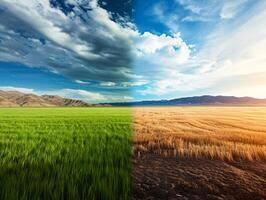Climate Threat to Africa's Food Exports May Empty EU Shelves
Climate change and biodiversity loss are crippling agricultural production in Africa, a key exporter of staples such as cocoa, coffee, and maize, putting Europe’s food supply at serious risk.
A new report by UK-based think tank Foresight Transitions has sounded the alarm on the growing vulnerability of European food security, highlighting that over half of the EU’s food imports come from countries that are highly vulnerable to climate change and lack the infrastructure and resources to adapt.
Africa, one of the world's leading agricultural regions, is particularly hard-hit. Countries like Côte d'Ivoire, Ghana, Cameroon, Nigeria, and Ecuador—which collectively account for the bulk of Europe’s cocoa imports—are facing increasingly erratic weather patterns, rising temperatures, and severe biodiversity loss. These challenges are reducing yields, threatening farmers’ livelihoods, and disrupting global supply chains.
The EU, the largest consumer, producer, and exporter of chocolate globally, is deeply dependent on cocoa supplies from these regions. However, cocoa is not easily grown within Europe due to climatic limitations, making the continent heavily reliant on imports for its chocolate industry.
“Investing in sustainable agriculture in Africa is no longer just about development—it’s a matter of food security for Europe,” said Dr. Elena Martinez, a senior analyst at Foresight Transitions. “If climate impacts continue unchecked, EU shelves may soon run out of coffee, chocolate, and other daily essentials.”
The report also emphasizes that coffee, tea, and maize, also heavily imported from Africa, are at risk. Coffee production, for instance, has already declined in regions such as Ethiopia and Uganda due to rising temperatures and reduced rainfall. Similarly, maize crops are suffering from increased pest invasions and prolonged droughts.
While some European policymakers have acknowledged the risks, concrete action has been limited. Experts urge the EU to scale up climate finance, support resilient farming practices, and invest in supply chain adaptation to mitigate potential shortages.
“This is not just a humanitarian concern—it’s an economic and geopolitical issue,” said Jean-Luc Dubois, a food security advisor with the European Commission. “Europe must treat agricultural resilience in Africa as a strategic priority.”
The report calls for enhanced cooperation between the EU and African nations, not only to support farmers but also to strengthen trade ties and build more resilient food systems that can withstand the growing impacts of climate change.
If action is not taken swiftly, experts warn, supermarkets across Europe could face shortages of common food items, and prices for staples such as chocolate and coffee could surge dramatically—affecting both consumers and industries alike.
Follow & Subscribe:
👉 Africa Agri Market on LinkedIn for the latest updates and insights.
🌐 Visit us at www.africa-agri-market.com for more information!
